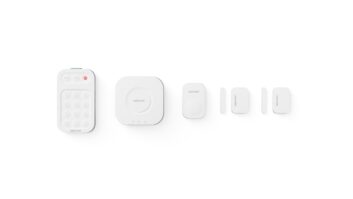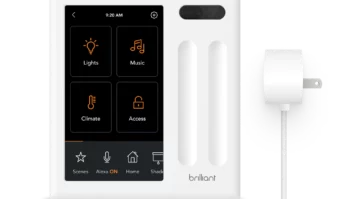New York — Family-owned Prodea Systems has developed a white-label mass-market home-automation system that, unlike competing systems, integrates control of home systems, networked A/V content, and third-party streaming and download services in one hub.
The systems, content and services are controlled from a single app running on iOS and Android devices or from a computer.
The company’s Residential Operating System (ROS) “protocol-agnostic” platform also connects to home health-care devices and telemedicine services, and it offers low-cost home VoIP phone service.
In the U.S., the Richardson, Texas-based company is targeting what it called “emerging” service providers and retailers, which could market their own private-label systems with recurring subscription revenues shared with Prodea. “Recurring services are an extremely high-margin business,” said Andrew Tauhert, marketing and business development executive VP.
In the U.S., Prodea is competing for retailers’ business with the likes of Zonoff, whose platform is sold by Staples under the Staples Connect brand, and AlertMe, whose platform and services are sold by Lowe’s under the Iris brand. (See here for more.)
Emerging service providers include residential developers. Prodea has signed up Miami-based Fort Capital Club and Hillwood Development, a Dallas-based Perot company. Other emerging providers include over-the-top (OTT) service providers that could incorporate additional services into their set-tops. For example, Canal Sur, a cable network providing Latin American content, is including ROS in its new over-the-top (OTT) service model.
Outside the U.S., Prodea has begun rolling products and services through telcos, cable companies, wireless carriers and other service providers, such as satellite-TV broadcasters.
In the U.S., there are many more channels through which to offer Prodea service than outside the U.S., said CEO Anousheh Ansari. In the U.S., she adds, traditional service providers as telcos and cable companies view home automation as an add-on to monitored security services, and service prices run at the higher end as a result.
Anousheh Ansari and the company’s other co-founders, president Hamid Ansari and CTO Amir Ansari, started up multiple technology companies over the past 20 years, including Telecom Technologies, which developed one of the first soft-switch platforms to switch analog phone calls to VoIP networks. The company was acquired by Sonus Networks in 2000 for $1.2 billion.
In launching its ROS platform in the U.S., the trio said they would offer retailers and other clients the flexibility to incorporate whatever wireless control protocols and third-party services, including streaming services that they want.
A hub demonstrated here by the company incorporated Wi-Fi, Wi-Fi Direct, and three USB ports that accept dongles incorporating Z-Wave, ZigBee, and Bluetooth. The system also supports multiple security-camera video-streaming protocols. Other wireless home-control protocols can be added based on a client’s wishes.
For home automation and control, the hub can be used with existing off-the-shelf home-automation products to control lights, thermostats, systems, door locks, security cameras, and other home systems. The system could be programmed, for example, to turn on lights and HVAC systems when someone opens a door, notify a mobile device that a door opens, stream a live video feed from a Wi-Fi security camera, or send a video clip to a mobile device or computer as an email or MMS. Consumers leaving home could be notified on their mobile device if they left lights or HVAC systems on.
Because ROS integrates the control of content and home systems, it offers such additional benefits as automatically dimming the lights whenever a movie is streamed from an embedded movie-streaming service. In such a scenario, the hub could also be programmed to forward all home phone calls to voice mail, switch a tablet to the IMDb web site for movie information, and prompt users to buy a pizza from Pizza Hut, said Andrew Tauhert, executive VP of marketing and business development.
The hub also controls cable and telco set top boxes, and to control the distribution of content stored on the home network, the hub features DLNA.
The hub also connects to multi-handset cordless-phone systems to deliver low-cost VoIP phone service, and it will convert voice mail to email and forward incoming calls to a cellphone equipped with a Prodea VOiP app.
In the home health-care segment, Prodea’s hub talks to such devices at Fitbit’s Wi-Fi scale as well as with glucometers, blood-pressure monitors and activity monitors, in turn connecting the devices to health and wellness services.
Prodea will supply a hub to clients or incorporate its technology in an OTT client’s set-top box or in such devices as a router or personal media server, she said. A hub could retail for $100, but some business models could price it for free with included subscription services, Tauhert said. Subscription prices in Europe range from 10 to 20 euros ($13.80 to $27.60).
Retailers will be able to sell Prodea’s subscription services for less than competing subscription-based platform providers because of its “distributed-Cloud architecture,” said Anousheh Ansari. “The complexity of managing multiple services is done within the hub at home, with authentication and billing accomplished in the Cloud,” she said,
As a result, Prodea’s services are scalable to millions of subscribers “with just a few racks of equipment,” thus enabling lower service prices compared with the competition, she said.
Retailers have “practically zero investment,” she continued. “Their costs are the marketing costs,” added Tauhert.
A retailer would bill customers based on data provided by Prodea, which would handle reconciliation with partners. Retailers would handle initial customer-service calls using Prodea tools that include some level of remote diagnostics. Prodea customer-service reps could be bridged in as needed. For its part, Prodea will handle software upgrades and device management, including the detection and troubleshooting of problems that might be occurring with individual products.













